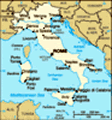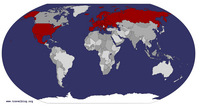Advertisement
Published: July 11th 2010
Milano was something of a disaster. I wasn’t hurt badly, but nothing I tried to do worked out.
Armani aggravation
My primary goal in Milano was to get pictures taken, wearing a new Armani suit. I contacted Armani headquarters the previous month, telling them I wanted to take pictures for a story I was pitching about the fashion awareness among Milanese.
They told me that would be fine. They didn’t speak English, but they still told me it would be fine.
When I arrived, no one at Armani was aware of my request, and the store manager Michelangelo said they needed to have confirmed clearance to have photos published of someone wearing their clothes (even though they were released several months ago). I ended up spending about two hours pacing about the store and picking out clothes I never got to wear. In the end I was given solid contacts to the Armani media department, with the opportunity to possibly try my modeling shtick again when I passed through another Italian city.
That was the largest failure of my trip to Milano.
More failures
I’d been trying to get some English books for a very long time. As a professional traveler,
I’ve been very interested to read the travels of Marco Polo, as well as the Motorcycle Diaries by Che Guevara. I believe I first looked in Lyon, but was unsuccessful. I next made a weak attempt in Rome, followed by Napoli and Palermo. Then I had an idea! I was headed to Malta, an Anglophile country! I found the biggest bookstore on Malta, and was certain I would be able to find at least ONE of these books. Of course none of the Maltese bookstores had my books either.
When I returned to Napoli, I decided to expand my search to include “On the Road” by Jack Kerouac, and found it easily. But in Milan, the second largest city in Italy, and the true metropolitan financial capital of the country, I was sure I could find my books - or so I thought.
After the Armani fiasco, most of my time had been eaten up. I was supposed to board an 11:20 train back to Modena. I had found two English language bookstores, one creatively titled “American Bookstore,” and the other called “English Bookshop.” I checked their hours on the Internet; one opened at 9:30, and the other at 10:30.
With only 50 minutes to catch my train, I tried calling them both to confirm that they had a copy of one of the books. No one answered at either number. They weren’t very far away, so I bought a subway ticket and wandered around until I found the American shop. They had recently changed their hours, and now only opened at 1:30pm on Mondays. Frustrated, I again tried to call the English shop, and still no answer. I got on the subway, got directions to this shop, and power-walked in that direction. When I arrived, there was another note on the door. This time it said they had just changed their hours also - opening at 3:30pm on Monday. Frustrated as hell, I hurried back to the underground, to arrive at the central train station exactly at 11:20. Just in time to watch my train leave without me.
Playing railroad bum
This began a triple series of catching “luxury” trains, being kicked off of them (after a couple of stops), and then boarding the next one. In the end, I saved myself a couple of precious hours of sunlight for my ride to Venezia.
Milanese restaurants
With my hosts Marco and Fiametta, we had to choose a restaurant for the evening. It took about half an hour. Every place they could think of was either closed on Sunday nights, or else terrible. They finally settled on an African restaurant, specializing in Eritrean cuisine. This was exciting to me, having eaten nothing but Italian food for three consecutive months. I wondered if there were more Ethiopians and Eritreans in Milan because it used to be Italy’s only colony.
The restaurant was located in a district called the Milano Harlem, where the first blacks moved in about 20 years ago.
I was prevented from ordering my first choice on the menu because rice dishes were not available on demand, you need to pre-order it when you set the reservation because it takes too long to prepare. My hosts said this is very common at restaurants in Milan, and they expect it.
My hosts said that Milan was becoming the New York City of Italy. With only 1.5 Million people, it has a long way to go.
Tourists and sideshows
Before I left for the train back to Modena, I wandered around the old fortress in the center of the city. The walls were a mesmerizing red brick color, and I stopped to admire the fountain out front.
My favorite moment in the entire city came when I took a video of some Japanese tourists having their picture taken. The group of them paused for a can-can pose in front of the fortress walls, all 14 of them needing their own picture of the pose (so they repeated it time and time again). It was a strange spectacle for me, as Japanese tourists are non-existent in Southern Italy (where I had just come from).
There are many Chinese in Milan. Curious enough, I saw a sign in Chinatown that said, “Passport to rent.” I would have expected a sign like this to be written in Chinese. I suppose the physical similarity among Chinese makes this an easy trick to pull.
As I was reaching the train station on the subway, I saw something completely original. An impromptu vocal concert from a young woman, obviously trying to earn contributions. As we rode along the metro, I first heard a beat, and then a pretty female voice singing what must have been a common Italian pop song. I got some video of the performance, which I appreciated for breaking up the mundanness of the morning labor commute. Months later, I on a city bus in Tijuana, I would witness a comedy act from a man dressed like a clown.
Once on board the train to Modena, we passed through a nasty, industrial town called “Fidenza”. How annoying it must be for these citizens, everywhere they go. They tell people they are from Fidenza, and people gush and tell them how beautiful their city is, and they have to say, “No, not Firenze, Fidenze.”
Buddhist musings: Life in the city vs. life in the country
By the end of my time in Milan, I began to see the constant frustration as an example of a new dichotomy. The thinking goes like this. In the city/society, there are many things that you want - but you can’t really have them. They are just there to tease you.
In the country, there are few
things that you want, and everything that you
need is essentially available to you.
If you take a child to a store, the child will most likely want something. If you agree to give it to him, there is a good chance that he will then want something else. With some children, you could agree to give them nine items or toys - but if you refuse them the tenth, they may explode into an angry fit and forget all the things that have been given to them.
My friend Hans from Malta developed a system for this in his own family, and he shared it with me. He allows his son to have one item that he asks for when they go to the store. If he asks for anything else, he loses the first candy or toy. Hans said his son only had to lose the toy
once before he learned his lesson. No more fights, happy kid.
My thought is that many/most people never grow out of this entitlement mindset. It certainly isn’t revolutionary to repeat Buddhist philosophy regarding freedom from
want.
Freedom from want is hard to achieve in urban districts. There’s so much
stuff all around you. But there is a different kind of freedom in poverty, in the frontier.
The frontiers of society, like the “frontier markets” described by economist Farida Khambata, are areas of lesser economic value to the banks, corporations, and powerful interests that control most of the developed world. This lack of economic value translates into the potential for freedom. If profit is not possible, these interests will avoid costly investments to expand their empires. If they do not expand to these regions, the autonomy, the freedom, and the natural identities remain.
To simplify, “wealth is universally destructive.”
Advertisement
Tot: 0.504s; Tpl: 0.016s; cc: 20; qc: 74; dbt: 0.1991s; 1; m:domysql w:travelblog (10.17.0.13); sld: 1;
; mem: 1.3mb









